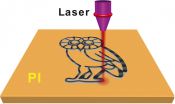Brain inflammation a hallmark of autism, large-scale analysis shows
Johns Hopkins study is largest so far of gene expression in autism brains
2014-12-10
(Press-News.org) While many different combinations of genetic traits can cause autism, brains affected by autism share a pattern of ramped-up immune responses, an analysis of data from autopsied human brains reveals. The study, a collaborative effort between Johns Hopkins and the University of Alabama at Birmingham, included data from 72 autism and control brains. It will be published online Dec. 10 in the journal Nature Communications.
"There are many different ways of getting autism, but we found that they all have the same downstream effect," says Dan Arking, Ph.D. , an associate professor in the McKusick-Nathans Institute for Genetic Medicine at the Johns Hopkins University School of Medicine. "What we don't know is whether this immune response is making things better in the short term and worse in the long term."
The causes of autism, also known as autistic spectrum disorder, remain largely unknown and are a frequent research topic for geneticists and neuroscientists. But Arking had noticed that for autism, studies of whether and how much genes were being used -- known as gene expression -- had thus far involved too little data to draw many useful conclusions. That's because unlike a genetic test, which can be done using nearly any cells in the body, gene expression testing has to be performed on the specific tissue of interest -- in this case, brains that could only be obtained through autopsies.
To combat this problem, Arking and his colleagues analyzed gene expression in samples from two different tissue banks, comparing gene expression in people with autism to that in controls without the condition. All told, they analyzed data from 104 brain samples from 72 individuals -- the largest data set so far for a study of gene expression in autism.
Previous studies had identified autism-associated abnormalities in cells that support neurons in the brain and spinal cord. In this study, Arking says, the research team was able to narrow in on a specific type of support cell known as a microglial cell, which polices the brain for pathogens and other threats. In the autism brains, the microglia appeared to be perpetually activated, with their genes for inflammation responses turned on. "This type of inflammation is not well understood, but it highlights the lack of current understanding about how innate immunity controls neural circuits," says Andrew West, Ph.D., an associate professor of neurology at the University of Alabama at Birmingham who was involved in the study.
Arking notes that, given the known genetic contributors to autism, inflammation is unlikely to be its root cause. Rather, he says, "This is a downstream consequence of upstream gene mutation." The next step, he says, would be to find out whether treating the inflammation could ameliorate symptoms of autism.
INFORMATION:
Other authors on the study are Simone Gupta, Shannon E. Ellis, Foram N. Ashar, Anna Moes, Joel S. Bader and Jianan Zhan, all of The Johns Hopkins University.
ELSE PRESS RELEASES FROM THIS DATE:
2014-12-10
HOUSTON - (Dec. 10, 2014) - Researchers at Rice University have created flexible, patterned sheets of multilayer graphene from a cheap polymer by burning it with a computer-controlled laser. The process works in air at room temperature and eliminates the need for hot furnaces and controlled environments, and it makes graphene that may be suitable for electronics or energy storage.
Under a microscope, what the researchers call laser-induced graphene (LIG) doesn't look like a perfect chicken wire-like grid of atoms. Instead, it's a jumble of interconnected graphene flakes ...
2014-12-10
Phoenix, AZ (December 10th, 2014) - The brain responds differently to two kinds of sugar, according to a report today at the American College of Neuropsychopharmacology annual meeting in Phoenix Arizona. The study suggests that fructose heightens the response of brain reward circuits to food cues, promoting feeding behavior.
Currently, roughly two out of three U.S. adults are overweight and one out of three is obese. Changes in lifestyle and dietary intake during the past quarter century are thought to be the main culprits, with the increase in fructose consumption of ...
2014-12-10
PISCATAWAY, NJ - Communities with fewer places to buy or drink alcohol also tend to have lower rates of intimate partner violence, new evidence suggests.
The research, published in the January issue of the Journal of Studies on Alcohol and Drugs, suggests that laws limiting what is called "alcohol outlet density" could offer one way to address violence within intimate relationships.
States and communities throughout the United States have enacted various laws to reduce excessive use of alcohol, including limiting outlet density, limiting hours and days of sale, and ...
2014-12-10
The simple act of saving something, such as a file on a computer, may improve our memory for the information we encounter next, according to new research published in Psychological Science, a journal of the Association for Psychological Science. The research suggests that the act of saving helps to free up cognitive resources that can be used to remember new information.
Our findings show that people are significantly better at learning and remembering new information when they save previous information," says psychological scientist and study author Benjamin Storm of ...
2014-12-10
PITTSBURGH, Dec. 9, 2014 - A treatment pioneered at the University of Pittsburgh Center for Vaccine Research (CVR) is far more effective than traditional antibiotics at inhibiting the growth of drug-resistant bacteria, including so-called "superbugs" resistant to almost all existing antibiotics, which plague hospitals and nursing homes.
The findings, announced online in the journal Antimicrobial Agents and Chemotherapy and funded by the National Institutes of Health, provide a needed boost to the field of antibiotic development, which has been limited in the last four ...
2014-12-10
Berkeley -- A systematic overview of more than 100 studies comparing organic and conventional farming finds that the crop yields of organic agriculture are higher than previously thought. The study, conducted by researchers at the University of California, Berkeley, also found that certain practices could further shrink the productivity gap between organic crops and conventional farming.
The study, to be published online Wednesday, Dec. 10, in the Proceedings of the Royal Society B, tackles the lingering perception that organic farming, while offering an environmentally ...
2014-12-10
In an editorial published online today in the International Journal of Epidemiology, experts from the Departments of Psychiatry and Epidemiology at Columbia University, New York, are calling for survivors of the Ebola epidemic to be mobilised in a bid to hasten containment of the disease.
We already know that the current Ebola outbreak is unique in its magnitude and for its dispersion in dense, mobile populations. Physicians and nurses face high mortality, and foreign aid in the form of medical supplies and staff continues to be unequal to the scope of the problem. With ...
2014-12-10
In a world first study researchers have found a coral-eating fish that disguises its smell to hide from predators.
"For many animals vision is less important than their sense of smell," says study lead author Dr Rohan Brooker from the ARC Centre of Excellence for Coral Reef Studies (Coral CoE) at James Cook University.
"Because predators often rely on odors to find their prey, even visually camouflaged animals may stick out like a sore thumb if they smell strongly of 'food'." Dr Brooker says.
The research, published in the journal Proceedings of the Royal Society B, ...
2014-12-10
In a report published today in the journal of Diabetes, Obesity and Metabolism, researchers from Cardiff University were also able to show a correlation between patients treated with a higher dosage of insulin and a raised risk of cancer development, heart attacks and stroke.
Researchers identified these trends by scrutinizing the medical history of 6,484 patients with type 2 diabetes extracted from the UK Clinical Practice Research Datalink (CPRD). Patients were on average aged 64 at the beginning of the study in 2000, and were followed for an average of 3 years from ...
2014-12-10
Fathering offspring is more than just a race to the egg
Longer sperm are better at fertilising eggs, study reveals
But females also influence a male's fertilising success
Research may produce clues to understanding human fertility
The chance of a male fathering offspring may not be a simple race to the egg, but is influenced by the length of the male's sperm, say scientists from the University of Sheffield.
Using a captive population of zebra finches, the researchers carried out sperm competition experiments between pairs of males, where one male consistently ...
LAST 30 PRESS RELEASES:
[Press-News.org] Brain inflammation a hallmark of autism, large-scale analysis shows
Johns Hopkins study is largest so far of gene expression in autism brains



